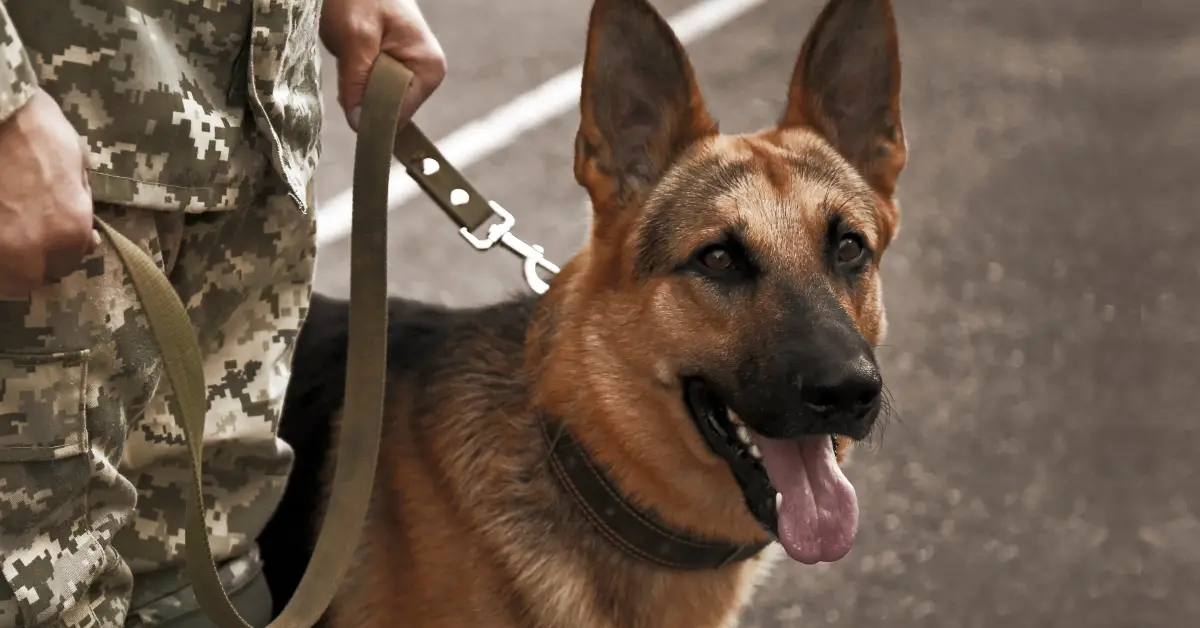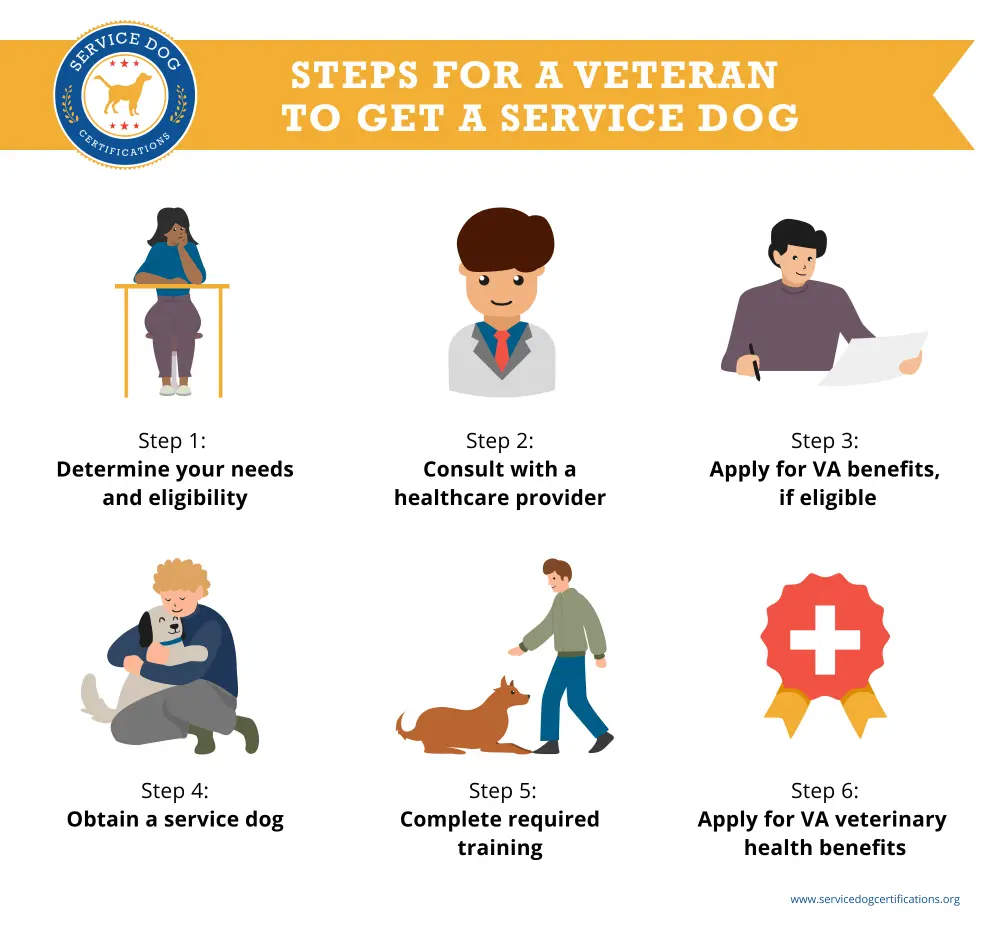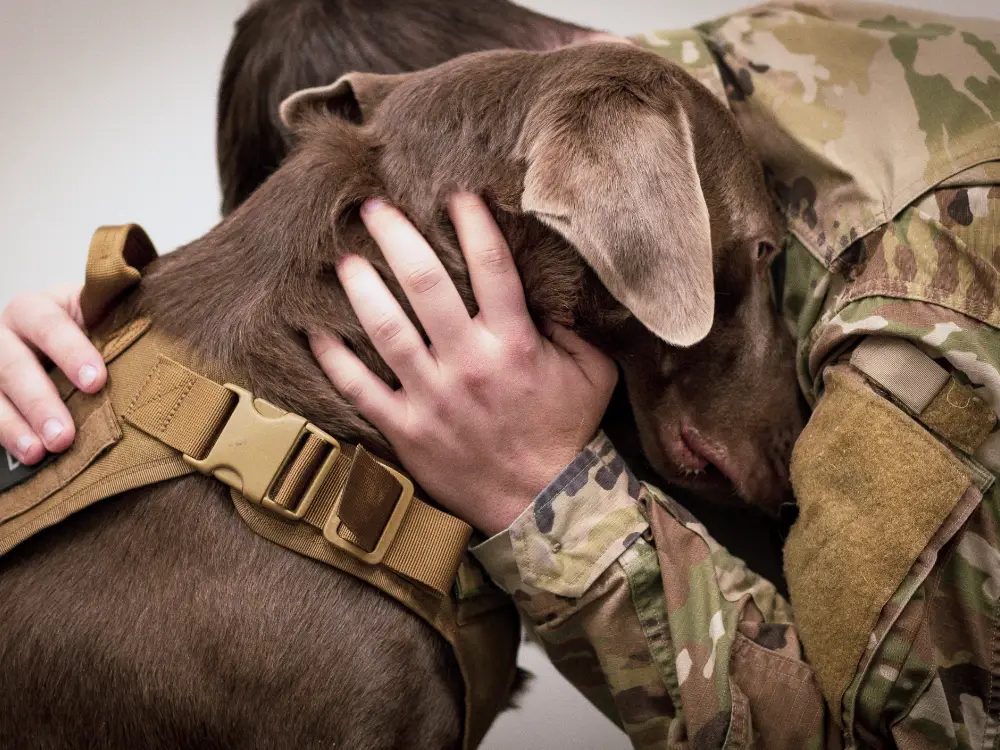Steps for Veterans to Get a Service Dog

The transition back to civilian life can hit hard. Physical injuries, PTSD, anxiety, depression — these aren’t just medical terms for many veterans; they’re daily battles. That’s where service dogs come in. These four-legged partners are trained to perform service dog tasks that make a real difference. Whether it’s retrieving items when mobility is limited, providing stability while walking, interrupting anxiety attacks, or navigating safely with vision impairment, these dogs help veterans reclaim independence in ways that other treatments sometimes can’t.
Veterans have two main pathways to obtain a service dog:
- Through the VA:
The Department of Veterans Affairs offers veterinary health benefits for qualifying veterans with visual impairments, hearing impairments, or mobility limitations (including those caused by mental health conditions). The VA doesn’t provide dogs directly but connects approved veterans with accredited training organizations and covers certain costs. - Outside the VA System:
Veterans who don’t qualify for VA service dog benefits or prefer not to use the VA system can still obtain service dogs through private trainers or by training suitable dogs themselves. The Americans with Disabilities Act (ADA) protects the rights of all people with disabilities to use appropriately trained service dogs, regardless of how they were obtained.
This guide will walk you through both paths, explaining each step of the process and what to expect along the way.

Share this image on your site
In this article:
- Step 1: Determine your needs and eligibility
- Step 2: Consult with a healthcare provider
- Step 3: Apply for VA benefits (if eligible)
- Step 4: Obtain a service dog
- Step 5: Complete required training
- Step 6: Apply for VA veterinary health benefits
- Options outside the VA
- Veteran-specific FAQ
Step 1: Determine Your Needs and Eligibility
Before starting the process to get a service dog, take some time to think about what kind of help you need. Service dogs can assist with many different tasks depending on your specific needs.
The VA offers benefits for service dogs that help with three main types of disabilities:
- Vision impairments — guide dogs can help you navigate safely
- Hearing impairments — hearing dogs alert you to important sounds
- Mobility limitations — these dogs can help with balance, retrieving items, or opening doors
It’s important to know that the VA also recognizes mobility service dogs for veterans whose mental health conditions (like PTSD) cause physical mobility limitations. Note that you can have a disability that isn’t one of these conditions and still have a service dog. Check out our full list of disabilities that qualify for a service dog.
Step 2: Consult with a Healthcare Provider
The next step is talking with a healthcare provider about how a service dog might help you. This conversation is important whether you’re seeking VA benefits or planning to get a service dog on your own.
If you’re hoping to get VA benefits
Your VA doctor or mental health provider needs to evaluate you to determine if a service dog would be the best option for your care. They’ll consider things like:
- How severe your limitations are
- Whether you can care for a dog
- If other treatments or devices might work better
The provider will document their findings in your medical record, which is necessary for the next steps in the VA process.
If you’re getting a service dog without VA support
It can still be a good idea to meet with a healthcare provider who can document your disability and your need for a service dog, though it’s not legally required under the Americans with Disabilities Act. The healthcare provider can give you a better understanding of your health condition and help you understand exactly what tasks would help with your specific needs, which makes training more effective.
Step 3: Apply for VA Benefits (If Eligible)
If your healthcare provider thinks a service dog would help you, the next step is applying for VA benefits.
For vision, hearing, or physical mobility service dogs
Your VA clinical provider will complete an evaluation and then work with you to submit the request through the Prosthetic and Sensory Aids Service at your local VA medical center. Think of this department as the people who help veterans get the tools they need — from wheelchairs to service dogs.
For mental health-related mobility service dogs
Your mental health team will need to show that your mental health condition causes significant mobility limitations. They’ll work with you to document how a service dog would help with these specific problems and send the request to the Prosthetic service.
The Prosthetic and Sensory Aids Service reviews all the information and decides whether to approve your request. This can take time, so be patient during this process. You’ll receive a notice about whether your request was approved or denied. While this guide is updated occasionally, be sure to check the VA’s latest policies and procedures before embarking on your service dog journey with them to ensure you have the most recent info.
Step 4: Obtain a Service Dog
How you get your service dog depends on whether you received VA approval.
If the VA approves your request
The VA doesn’t give you a dog. Instead, they’ll refer you to organizations that are accredited by Assistance Dogs International (ADI) or the International Guide Dog Federation (IGDF).
These organizations will work with you to match you with the right dog for your needs. Many have waiting lists, so you might not get a dog right away. The matching process is important because you and your service dog will be a team, and finding the right fit matters.
If you’re getting a service dog without VA approval
You have several options:
- Apply directly to service dog organizations (some focus specifically on helping veterans)
- Adopt a dog with the right temperament and work with a professional trainer
- Train a dog yourself if you have the knowledge and skills
When choosing a dog for service work, temperament matters more than breed. The dog needs to be calm, trainable, and comfortable in different environments. Not every dog is suited for service work, so proper assessment is key.

Step 5: Complete Required Training
Training is what transforms a dog into a service dog. This training teaches the dog to perform specific tasks that help with your disability and to behave appropriately in public.
For VA Benefits
Here’s the deal with the VA – they’ll only cover costs if your dog was trained by an organization with credentials (specifically ADI or IGDF accreditation). It’s frustrating for some veterans, but the VA wants proof that the dog meets certain standards. After you finish training, you’ll get a certificate that basically acts as your golden ticket for VA benefits.
What does this training actually look like? First, there’s basic stuff like teaching the dog to heel, sit, and stay — even when distractions are everywhere. Then comes the specialized training for your specific needs. If balance is your challenge, the dog learns to brace. The final piece is learning to work together as a team because this isn’t just about a trained dog — it’s about the two of you functioning as a unit.
Without VA Benefits
If you’re training your service dog or working with a non-accredited trainer, the ADA doesn’t require any specific certification. However, the dog must still be trained to:
- Perform tasks directly related to your disability
- Behave properly in public settings
- Respond reliably to your commands
Whether through the VA or on your own, expect training to take several months to a year. This isn’t a quick process, but the result is a highly skilled service animal that can truly improve your life. To get an idea of what the training process looks like, check out our service dog training guide.
Step 6: Apply for VA Veterinary Health Benefits
If you went through the VA process and completed training with an accredited organization, you can now apply for veterinary health benefits.
What you’ll need to do:
- Submit your training completion certificate to the VA
- Complete any additional paperwork they require
What the VA will cover:
- A commercially available insurance policy for your service dog’s medically necessary veterinary care (including prescription medications and euthanasia if needed)
- Hardware your dog needs to perform tasks (like a special harness)
- Travel expenses related to getting your service dog
Remember that while the VA pays for the insurance premiums, copayments, and deductibles, you’ll be responsible for any costs that exceed the policy’s limits for a particular procedure or treatment.
What you’ll still need to pay for:
- Food
- Regular grooming
- Toys and bedding
- License tags
- Boarding when needed
These benefits help ensure your service dog stays healthy and can continue to assist you. The VA provides these benefits because they recognize that a service dog is a medical aid, not just a pet.
Options Outside the VA
Maybe the VA turned down your request, or perhaps your needs don’t fit within their guidelines. Don’t lose hope – you still have options for getting a service dog. A rescue dog can make a great service dog if it has the right attributes – a service dog does not necessarily have to come from an organization or be a pure breed.
Some nonprofit organizations specialize in providing dogs to veterans at reduced cost or even free. Some examples include:
These organizations often have application processes and qualification requirements, so research several to find the best fit.
If cost is a concern, look into:
- Fundraising through platforms like GoFundMe
- Grants specifically for veterans seeking service dogs
- Local veteran service organizations that may provide financial help
Remember that under the law, you have the right to train your service dog. While this takes considerable skill and time, it can be more affordable. Consider working with a professional trainer who offers a service dog training program where you can learn alongside your dog.
Veteran-Specific FAQ
Does the VA provide service dogs directly to veterans?
No. The VA doesn’t hand out dogs. Instead, they refer approved veterans to accredited training organizations and help cover certain costs like veterinary care.
What types of service dogs qualify for VA benefits?
The VA covers three main types: guide dogs for vision impairment, hearing dogs, and mobility service dogs. This includes mobility service dogs that help with limitations caused by mental health conditions like PTSD. The key factor is that the dog must help with mobility, not just provide emotional support.
What if I need a psychiatric service dog that doesn’t help with mobility?
This is an important distinction in the current VA program. The VA specifically states benefits are for veterans “diagnosed as having a visual, hearing, or substantial mobility impairment.” For mental health conditions, they must cause “substantial mobility limitations” to qualify. If your PTSD or other mental health condition requires a service dog for tasks like interrupting nightmares, providing medication reminders, or creating a safe personal space, but you don’t have mobility limitations, the VA program currently doesn’t cover these benefits. You can still legally have and use such a service dog, but you’ll need to cover the costs yourself or seek help from non-VA organizations that specialize in psychiatric service dogs for veterans.
How long does the VA approval process take?
The process varies widely depending on your local VA facility and your specific case. From initial consultation to final approval, it can take several months. Then, there’s often a waiting period with the training organization. Be prepared for the entire process, from the first appointment to receiving a trained dog, which may take a year or longer.
What costs does the VA cover, and what costs am I responsible for?
Let’s talk money – the VA isn’t picking up the whole tab. They’ll cover the big medical stuff through veterinary insurance, the specialized equipment your dog needs to work (like a mobility harness), and they’ll reimburse your travel costs when you first get the dog.
But day-to-day? That’s on you. Food, treats, toys, beds, grooming — it adds up. Figure about $1,500-2,000 per year at minimum for basic care. Need to board the dog while you’re hospitalized or traveling somewhere the dog can’t go? That’s your dime too. Same goes for license fees and regular preventative care like flea and tick treatments. It’s not a small change, so factor this into your decision.
Can I get a service dog if I have a 100% disability rating?
A 100% disability rating doesn’t automatically qualify you for a VA-supported service dog. What matters is whether a service dog’s tasks can help your specific disability and whether that’s the best option for you. Your rating may help with other benefits, but the service dog approval depends on your specific needs.
What happens if my service dog can no longer work due to illness or age?
Service dogs typically work for 8-10 years before retirement. If your VA-approved service dog can no longer work, the VA will cover travel expenses related to getting a replacement dog. You’ll need to go through the training and certification process again with the new dog to maintain your benefits.
If I train my service dog, can it still qualify for VA benefits?
Currently, no. The VA document specifically states: “The dog and veteran must have successfully completed a training program offered by an organization accredited by Assistance Dogs International or the International Guide Dog Federation.” You must provide a certificate showing successful completion from the accredited organization. While the ADA allows people to train their own service dogs for public access rights, the VA requires accredited organizational training to receive their veterinary health benefits.
To register your Service Dog and order your Service Dog Certification, click on the link below.
About the Author: The writing team at Service Dog Certifications is made up of folks who really know their stuff when it comes to disability laws and assistance animals. Many of our writers and editors have service dogs themselves and share insights from their own experiences. All of us have a passion for disability rights and animals.
Related Articles

Hipster Dogs: Trendy Pups, Beards, and Beanies
From PBRs to beanie caps, and from plastic sunglasses to “pawsome” music, hipster dogs have taken the world by storm — and there’s no turning back. Because, let’s face it, these little guys and gals were rocking the style before it was cool — not that they would care what’s cool, though. For a “pawsitevly” […]

Read More

How Dogs Can Calm Anxiety
A person suffering from anxiety attacks experience many risks, and it’s one of the reasons why it’s prudent to consider having a service dog or emotional support animal as a companion. The animal can keep the environment safer for the individual and below are some of the ways a dogs can calm anxiety: 1) Dogs […]

Read More

Can Cats Be Service Animals?
Having a cat brings the same positive effects as dogs. These pets can be equally beneficial to a person’s health. Experts have proven that cat owners are less likely to have a health emergency, such as a heart attack, with their feline companion around and cats have also been proven to help alleviate sleeping disorders, […]

Read More
Can I get my own dog and hv him registered as service dog?
Yes, you can train and certify your service dog yourself. You may find this article on service dog training interesting: https://www.servicedogcertifications.org/service-dog-training-guide-the-basics/
Are German Shepherd dogs considered good candidates for service dogs?
In general, German Shepherds make excellent service dogs. However, it always depends on the handler’s needs if they benefit best from a German Shepherd or if they should have a smaller or larger breed dog. For example, for handlers with a mental health disorder, German Shepherds are among the 10 best service dog breeds https://www.servicedogcertifications.org/10-best-psychiatric-service-dog-breeds/
If I have a dog will the VA pay for my dog to be trained or do I pay for the training and I will get reimbursed or it’s on the Veteran to have them trained?
My ex husband has had a hip replacement and severe glaucoma. He has been legally blind for many years.
How can I qualify him for a service dod?
If you need advice if your ex-husband would benefit from a service dog, and what tasks the service dog could perform for him, it’s best to talk to his doctor. Together you might be able to define what type of dog would be the best fit. You may find this article on qualifying for a service dog interesting https://www.servicedogcertifications.org/disabilities-qualify-service-dog/
My VA psychiatrist said the VA will not recommend service animals for Veterans because they will use them as crutches and not fully recover from the trauma. I’m still fighting it but it’s more depressing to be prescribed pills and not something I think that would be more therapeutic.
OMG, I am sorry but your VA psychiatrist is a quack. There are endless benefits to having a service dog. Likewise, multiple studies and research that prove the benefits of service dogs. Look into the Library of Medicine and you’ll find all the information you need in regards to service dog benefits. I copied this phrase from one of the most common statements, “Service dogs act as loyal companions which can help ease feelings of loneliness and provide a sense of security and consistent care. As they say, dogs are man’s best friend! Studies have also shown that service dogs provide health benefits and can increase fitness, lower stress, and improve happiness.” You might need to get a new therapist. There are many programs available that provide free therapy outside of the VA; look into one of these. It shouldn’t be difficult just a little time-consuming. Most doctors want to fix you up with pills instead of teaching coping mechanisms. Pills are what keeps their job going. Therapy that teaches you to deal with your trauma is temporary and you might need fewer visits in the future to keep you studied in your treatment. If any doctor/psychiatrist wants to fill you up with pills and avoids other options, run away. A good doctor will always give you options that benefit your well being. Best of luck and many prayers for you, don’t give up please.
Agreed. This guy needs a new shrink. Both of my docs actually recommended this to me, that’s the reason I’m looking into it.
I agree with you 100% I hate taking pills. A dog would be better for me too
You have the right to request a new doctor. I have done that and they do not even question why, they just do it because it is your right as a patient!
Ask your idiot lazy shrink about the 22 vets a day that kill themselves. What are they leaning on? That person is just being ignorant and doesn’t want to do the paperwork.
Hello, Do they give us a Service dog to adopt or do we got our own service dog ?
This is very misleading. To receive benefits the dog has to be a graduate from an Assistance Dogs International program. Don’t go get a dog prior to talking to the program you plan to apply to. Many will not accept outside dogs and the ones that will have very specific requirements!
Service dogs do not have to be trained by any particular organization, they can even be self-trained by the owner.
The VA doesnt provide service dogs as of Feb 2022. Only Veterinarian insurance, which the dog has to graduate from ADI or the IDGF programs to qualify. The PAWS act is only a pilot program that will be in only 5 VA’s for five years. The sites have yet to be determined. There has been no guidelines as of yet on how the VA is going to implement this pilot program. To be determined.
I have one from the VA from a spinal injury, tbi, and my ptsd so don’t know why you did not get one from them.
I am a 100% mentally disabled veteran due to a service connect PTSD condition caused be sexual trauma while in the Military. I’m frequently emotional with depression, anxiety, flashbacks, violent nightmares, hearing voices and seeing hallucinations and have flashbacks and more symptoms while my time in the military. I live alone and feel a need to have a service dog to help me emotionally. I feel that it will help me cope with my issues. But I have one problem, my landlord does not accept pets of any kind at the apartments where I live. Is there anyway that you can look into this.
We strongly recommend speaking to your licensed therapist or doctor about your mental health issues. You may find these articles about PSDs and ESAs helpful:
https://www.servicedogcertifications.org/psychiatric-service-dog/
https://www.servicedogcertifications.org/emotional-support-dog-requirements/
I have PTSD and a US Navy vet and was wondering how to have my cat put on as my emotional support animal
You may find this article helpful (the title says it’s for dogs, but the process for getting an emotional support cat is the same): https://www.servicedogcertifications.org/how-to-get-an-emotional-support-dog-letter/
My name is Michael J. Daniels 4year verteran Air Force Turkey I suffer with PTSD, anxiety,and social phobia. Can I choose the dog I like. I been study the Belgian Malinois dog
We suggest consulting with your healthcare professional and possibly a trainer to see what breed may be appropriate for you. The right breed depends on the owner’s specific needs (i.e., the job they need the dog to perform in relation to their disability).
I already have a letter from my VA Therapist stating that I would benefit from having an emotional support animal and I have a wonderful dog already that helped me. I just need to get identification. For her and supplies for her that identify her as an emotional support animal.
An ESA letter is all you need to qualify for an emotional support animal, but you can also get an ID card at your option once you qualify so you can let others easily know your pet is an ESA. Please see this link to obtain an ID card: https://www.servicedogcertifications.org/emotional-support-animal-id/
Hello, my name is Joe Quilkes and I am a veteran retired. Two weeks ago, I had to put my service dog down. We were in the Army together for two years. I am getting a new service dog puppy in training, and I would like to know more about the benefits that you offer. I have several disabilities and the I need a new service dog.
We’re so sorry to hear about the passing of your service dog, and we thank you for your service. Once your new service dog is fully trained we would be happy to help you with service dog accessories like ID cards, certificates, tags and vests. You might find this article on service dog requirements useful in the meantime: https://www.servicedogcertifications.org/service-dog-requirements/
I have severe migraine headaches (approx. 4 to 7 a day) and knee problems. I’m 100% disabled. Would I qualify for a service dog?
We suggest talking to your healthcare provider and possibly consulting with an experienced service dog trainer.
We adopted a dog from a local rescue. We would like to attend your training to become a certified emotional pet.
We are not a training organization but we think you might find this article helpful if you’re just getting started with the service dog process: https://www.servicedogcertifications.org/service-dog-requirements/
I am 100% Disabled for Asthma/ Chronic Obstructive Pulmonary Disease, do I qualify for a service dog
Having an eligible disability is the first step. The next step is to have a need for a trained service dog that somehow directly assists with managing your condition by performing a specific job or task.